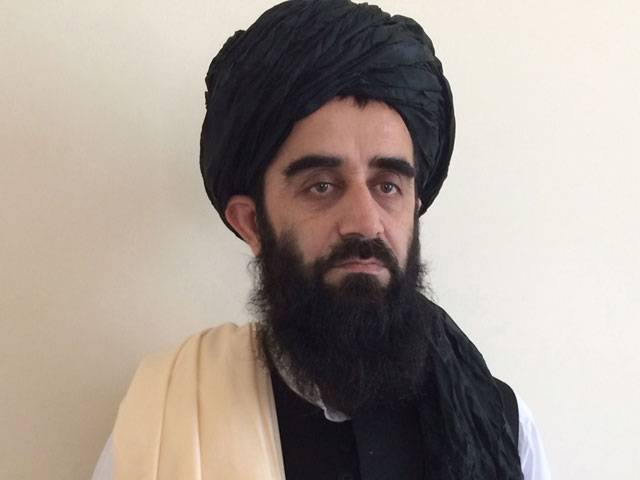Faced with the prospect of unending war in Afghanistan, a moderate faction of the Taliban is pushing hard for a new peace dialogue in a move fraught with danger but openly welcomed by Kabul.
The risk these rebels face was made starkly clear last week when one of their senior figures, Abdul Raqeeb, was gunned down outside a religious seminary in Peshawar on his way home.
While sitting on the back of a motorbike driven by one of his students on Monday afternoon, he was shot and killed by two assassins in an attack that, like others in the past, has gone unclaimed. A few days earlier, he had travelled to Dubai for a gathering of other senior Taliban members led by former minister Aga Jan Motasim, who are in favour of beginning a peace process.
Mullah Raqeeb planned to return to Dubai soon and members of the Afghan government's High Peace Council were also set to visit, in a sign that the moribund dialogue process might be relaunched. Instead, he joined a list of dozens of other "moderate" exiled members of the hardline movement to have lost their lives in mysterious circumstances in Pakistan over the last few years.
Shadowy killings
Publicly, senior Taliban figures accuse the Afghan secret services or the Americans of being behind the killings. But in private many suspect elements within Pakistan's ‘shadowy’ establishment of playing a part.
"As soon as they want to make progress, Pakistan puts itself in the way," complained one Taliban source exiled in Pakistan, who spoke to AFP on condition of anonymity.
Another member added: "Several of our leaders want to make progress towards peace, but they don't say it out of fear of reprisals" - from Pakistan or other members close to its security services.
After the Taliban’s overthrow in the US-led invasion of 2001, many crossed the border to seek shelter, and Islamabad was long suspected of favouring their eventual return to power.
That position has now changed, according to many Pakistani officials, with Prime Minister Nawaz Sharif and the military worried about the spread of radical Taliban ideas in their own country.
Islamabad is now officially in favour of an "inclusive" peace process comprising all Afghan factions including the Kabul government - with whom once-frosty relations have improved - and the "moderate" rebels. But parts of the powerful Pakistani security services are regularly accused of trying to keep control over their hardline allies.
Motasim's initiative in Dubai could therefore have been seen as a threat. "Any Taliban who wants to negotiate without the consent of Pakistan might become a target. Pakistan is not necessarily against talks, but wants control of the process," said Thomas Ruttig from the Afghan Analysts Network, a think-tank.
In Dubai Motasim succeeded in bringing together about 30 members from Afghanistan and Pakistan, including seven former ministers and eight military commanders, according to a Taliban source. All were keen on a dialogue comprising all factions to achieve the insurgents' core demands: pacifying the country and ensuring all foreign troops leave Afghan soil.
Warm words
Separate statements by the High Peace Council (HPC) and Motasim on Saturday confirmed the meeting had taken place.
The council said it had met four members of the Taliban and the two parties had decided to "continue the negotiations process in, as well as outside, the country". "The HPC welcomed this decision," their statement said.
Motasim's faction meanwhile praised the release of "Taliban and other Afghan prisoners" by Afghan President Hamid Karzai, a move that outraged the United States.
Karzai had in addition denounced the execution of Raqeeb as the killing of "a supporter of peace and reconciliation". He even sent military helicopters to transport the body of the former Taliban minister for refugees to its burial place in an isolated village in northern Afghanistan.
But for the moderate Taliban, persuading Kabul of their goodwill is the easy part. Bringing along the rest of the fragmented insurgent group and convincing overall leader Mullah Omar is more difficult - and dangerous. Omar has so far refused to entertain any peace process until foreign troops have left Afghanistan.
Motasim has also made enemies in the central Taliban leadership, which decried his meeting as "detrimental" to the movement and "beneficial to US and their stooges". "Motasim has been active in promoting this for several years, but he didn't manage to shift the positions so far," said Ruttig from Afghan Analysts Network.
And any final solution would need to be palatable to all sides - the Kabul government, the Taliban, Pakistan and the Americans. Many senior Taliban figures fear that finding common ground will prove impossible and the country could slip into another civil war. But not all.
"We know that the majority of Afghans want peace and we'll do everything to convince as many people as possible," an ally of Motasim told AFP. "Well... as long as we don't get killed first."–AFP
Thursday, April 18, 2024
Despite dangers, 'moderate' Taliban talk peace

Caption: Despite dangers, \'moderate\' Taliban talk peace
Enemies of Pakistan are unable to digest investment in the country: Ataullah Tarar
1:29 PM | April 18, 2024
IHC restores Bushra Bibi's appeal for shifting to Adiala Jail from Bani Gala
1:24 PM | April 18, 2024
ITP cracks down on traffic violations
April 18, 2024
Illegal housing societies in Rawalpindi to face crackdown
April 18, 2024
Hepatitis Challenge
April 18, 2024
IMF Predictions
April 18, 2024
Wheat War
April 18, 2024
Rail Revival
April 17, 2024
Addressing Climate Change
April 17, 2024
Justice denied
April 18, 2024
AI dilemmas unveiled
April 18, 2024
Tax tangle
April 18, 2024
Workforce inequality
April 17, 2024
New partnerships
April 17, 2024
ePaper - Nawaiwaqt
Advertisement
Nawaiwaqt Group | Copyright © 2024





